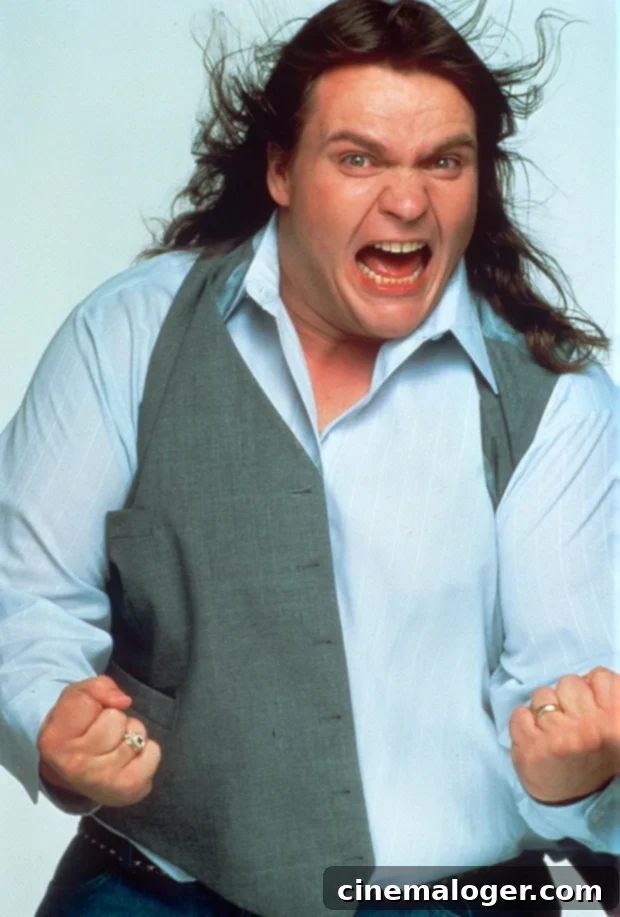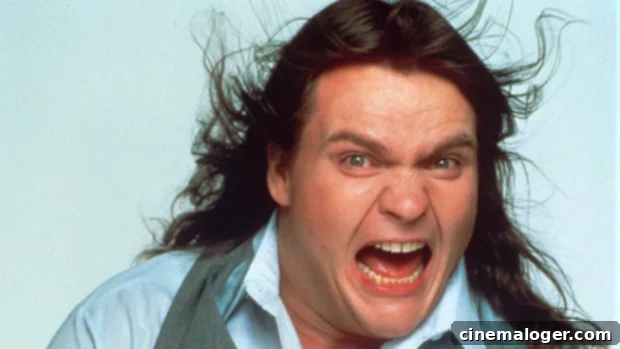Meat Loaf, Iconic Rock Legend and Actor, Dies at 74: A Tribute to an Unforgettable Career
The music world mourned the loss of a true original as Michael Lee Aday, globally celebrated as Meat Loaf, passed away at the age of 74. His family confirmed the heartbreaking news via his official Facebook page, leaving fans and peers alike reflecting on an extraordinary career that spanned six decades. The Davidson County Medical Examiner’s office later confirmed his passing to HollywoodLife, noting, “I can confirm that Michael Lee Aday has been reported to our office as he has passed away. No cause or manner of death is available at this time.”
The official statement released by his family read, “Our hearts are broken to announce the incomparable Meat Loaf passed away tonight surrounded by his wife Deborah, daughters Pearl and Amanda, and close friends.” It continued, highlighting the immense scope of his impact: “His amazing career spanned six decades that saw him sell over 100 million albums worldwide and star in 65 movies, including Fight Club, Focus, The Rocky Horror Picture Show and Wayne’s World.”
A specific mention was made of his monumental musical achievement: “Bat Out of Hell remains one of the top 10 selling albums of all time. We know how much he meant to so many of you and we truly appreciate all of the love and support as we move through this time of grief in losing such an inspirational artist and beautiful man. We thank you for your understanding of our need for privacy at this time. From his heart to your souls…don’t ever stop rocking!’” This heartfelt message encapsulated the passion and dedication that defined Meat Loaf’s life and work, resonating deeply with the millions who admired his unique artistry.

The Genesis of a Rock Icon: From Marvin Lee Aday to Meat Loaf
Born Marvin Lee Aday on September 27, 1947, in Dallas, Texas, the artist who would become known as Meat Loaf endured a challenging childhood. He often recounted stories of his difficult relationship with his alcoholic father and the strength he drew from his mother. It was during his formative years that his powerful voice and theatrical tendencies began to emerge, first in school productions and then more formally during his college years in Texas. The moniker “Meat Loaf” itself has several origin stories, including one involving a coach and another related to his physical stature, adding to the mystique of his persona.
In his early 20s, Aday made the pivotal move to Los Angeles, a common pilgrimage for aspiring performers. It was there that he fully committed to pursuing a career in both acting and music. His journey into the entertainment world was not immediate stardom but a gradual ascent, marked by hard work and an undeniable stage presence. His early theatrical endeavors included roles in Broadway musicals such as “Hair,” where he honed his ability to command an audience with both his voice and dramatic flair. This early exposure to the stage laid crucial groundwork for the bombastic, operatic rock style that would define his future musical career.
The Phenomenon of “Bat Out of Hell”
The true turning point in Meat Loaf’s career arrived in 1977 with the release of his seminal album, Bat Out of Hell. This masterpiece was the result of a profound and enduring collaboration with songwriter Jim Steinman. Together, they crafted an album that transcended traditional rock music, blending elements of Broadway, opera, and hard rock into a unique, narrative-driven sound. Steinman’s epic compositions, characterized by elaborate arrangements, sweeping orchestral elements, and dramatic storytelling, perfectly complemented Meat Loaf’s powerful, soaring vocals and theatrical delivery.
Initial critical reception was mixed, and finding a record label willing to release such an unconventional album proved challenging. However, perseverance paid off. Once released, Bat Out of Hell slowly but surely captivated audiences, growing into a global phenomenon. Its iconic cover art, depicting a motorcycle-riding demon bursting from a graveyard, became instantly recognizable. The album spawned anthemic hits such as the title track “Bat Out of Hell,” the iconic duet “Paradise by the Dashboard Light,” and the power ballad “Two Out of Three Ain’t Bad.” These songs explored themes of teenage angst, forbidden romance, rebellion, and the bittersweet pains of growing up, resonating deeply with generations of listeners.
The album’s success was monumental, eventually selling over 43 million copies worldwide, making it one of the best-selling albums of all time. Its enduring appeal lies not just in its commercial triumph but in its unique artistic vision. Bat Out of Hell solidified Meat Loaf’s reputation as a theatrical rock and roll titan, a performer whose music wasn’t just heard but experienced.
A Dynamic Musical Journey and Triumphant Comebacks
Following the groundbreaking success of Bat Out of Hell, Meat Loaf continued his musical journey, though it was not without its challenges. Subsequent albums like Dead Ringer (1981), Bad Attitude (1984), and Blind Before I Stop (1986) showcased his vocal prowess and dedication to his craft, but none quite matched the gargantuan sales of his debut. Disputes with his record label, legal battles, and the strenuous demands of touring took their toll, leading to periods of creative and personal struggle.
However, Meat Loaf proved to be an artist of immense resilience, always finding a way to return to the spotlight. His most significant comeback arrived in 1993 with Bat Out of Hell II: Back into Hell, once again collaborating with Jim Steinman. This album not only recaptured the magic of their original partnership but delivered one of the biggest hits of the decade: “I’d Do Anything for Love (But I Won’t Do That).” The power ballad, with its memorable music video and Meat Loaf’s impassioned performance, earned him a Grammy Award for Best Rock Vocal Performance, Solo, and solidified his status as a legendary figure. The album sold over 15 million copies globally, proving that his unique blend of rock opera still resonated powerfully with a new generation.
His later albums included Couldn’t Have Said It Better (2003), Bat Out of Hell III: The Monster Is Loose (2006), and his final studio album, Braver Than We Are (2016). Throughout his career, Meat Loaf was celebrated for his electrifying live performances, where his larger-than-life persona, boundless energy, and powerful voice transformed concerts into immersive theatrical experiences. He recorded a total of 12 studio albums, each contributing to a rich discography that showcased his enduring artistic vision.
A Versatile Actor with Memorable Roles
Beyond his monumental success in music, Meat Loaf cultivated a significant and diverse acting career, appearing in over 65 films and television shows. His theatrical background provided him with a natural ease in front of the camera, allowing him to inhabit a wide array of characters with distinct presence and charisma.
One of his most iconic acting roles came early in his career as Eddie, the ex-delivery boy biker, in the 1975 cult classic film adaptation of The Rocky Horror Picture Show. His performance of “Hot Patootie – Bless My Soul” remains a fan favorite and a testament to his vibrant stage presence. Decades later, he delivered another unforgettable performance as Robert “Bob” Paulson in David Fincher’s critically acclaimed 1999 film Fight Club. His portrayal of the empathetic, muscle-bound former bodybuilder offered a nuanced and poignant counterpoint to the film’s darker themes, demonstrating his dramatic range and ability to steal scenes.
Meat Loaf also lent his distinctive personality to comedic roles, notably as the bouncer Tiny in the 1992 hit comedy Wayne’s World. His filmography also includes roles in Roadie (1980), Focus (2001), Black Dog (1998), Spiceworld The Movie (1997), and appearances in popular television series such as House, Monk, Masters of Horror, and Glee. Whether playing menacing figures, sympathetic characters, or comedic relief, Meat Loaf brought a unique blend of intensity and warmth to every role, making him a truly versatile and beloved actor.
Personal Life and Enduring Relationships
Behind the flamboyant stage persona, Meat Loaf led a relatively private personal life, deeply valuing his family. He was previously married to Leslie Edmonds from 1979 until 2001. During this marriage, he adopted Leslie’s daughter, Pearl, who herself became a talented singer and performer, often touring as a backing vocalist for her father. Together, Meat Loaf and Leslie also had another daughter, Amanda Aday, who followed in her father’s footsteps into acting. In 2007, he found love again and married Deborah Gillespie, and they remained together until his passing. His family was a constant source of support and inspiration throughout his long and demanding career.
Battles with Health and Unyielding Resilience
Throughout his later years, Meat Loaf openly battled various health issues, yet his commitment to his music and fans remained unwavering. He had numerous health scares that often played out in the public eye, including collapses onstage and injuries sustained during performances. In 2016, he famously collapsed during a concert in Edmonton, Canada, which was attributed to severe dehydration. Just a few years later, in 2019, he suffered a broken collarbone after falling off stage during an interview event. These incidents, alongside other chronic health challenges, including asthma and heart conditions, highlighted the immense physical toll his high-energy performances took on his body.
Despite these setbacks, Meat Loaf consistently defied expectations, demonstrating incredible resilience and a sheer force of will to continue performing and connecting with his audience. His dedication to his craft was legendary, often pushing himself to the limits, driven by the belief that he owed his fans nothing less than a full, passionate performance. His ability to bounce back from adversity became another testament to his enduring spirit.
A Lasting Legacy: Don’t Ever Stop Rocking!
Meat Loaf’s passing marks the end of an era, but his legacy as a rock and roll icon will undoubtedly endure. He was more than just a singer; he was a storyteller, a performer, and a true original whose unique blend of operatic rock, theatricality, and raw emotional power captivated millions worldwide. His music, particularly the timeless masterpiece Bat Out of Hell, continues to resonate with new generations, a testament to its universal themes and epic scope.
His distinctive voice, powerful stage presence, and memorable acting roles have left an indelible mark on both the music and film industries. Meat Loaf carved out a niche entirely his own, proving that rock music could be both grandly theatrical and deeply personal. Tributes from fellow musicians, actors, and countless fans poured in from around the globe, all echoing a profound admiration for his talent, his larger-than-life persona, and his unwavering dedication to his art.
As per his family’s touching final words, echoing the sentiment he embodied throughout his life: “From his heart to your souls…don’t ever stop rocking!’” Meat Loaf’s spirit of passion, drama, and unbridled rock and roll will forever continue to inspire, ensuring that his music and memory will live on.
